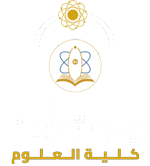Graduation Requirements
.The graduation requirement for obtaining a Bachelor’s degree in Science is the successful completion of 136 credit hours, in addition to the Human Rights cours
Distribution of Credit Hours and Graduation Requirements for the Bachelor’s Degree, Including Mandatory and Optional Hours:
| م | المطلب | عدد الساعات | النسبة المئوية | تعريف بالمطالب | ||
| اجباري | اختياري | مجموع | ||||
| 1 | متطلبات الجامعة | 2+4* | 4 | 2+8* | 5.88 | في المستوي الأول غالبا |
| 2 | متطلبات الكلية | 28 | ـــــــــــــــــــــــ | 28 | 20.59 | في المستوي الأول غالبا |
| 3 | متطلبات التخصص المنفرد | 60 | 30 | 90 | 66.18 | يبدأ الطالب دراسته اعتبارا من المستوي الثاني |
| 4 | متطلبات التخصص الرئيسي | 46 | 20 | 66 | 48.53 | يبدأ الطالب دراسته اعتبارا من المستوي الثاني |
| 5 | متطلبات التخصص الفرعي | 16 | 8 | 24 | 17.65 | يبدأ الطالب دراسته اعتبارا من المستوي الثاني |
| 6 | متطلبات التخصص المزدوج | 60 | 30 | 90 | 66.18 | يبدأ الطالب دراسته اعتبارا من المستوي الثاني |
| 7 | الاختيار الحر | ــــــــــــ | 6 | 6 | 4.41 | يبدأ الطالب دراسته اعتبارا من المستوي الثاني |
| 8 | تدريب ميداني | 2 | ــــــــــــــــ | 2 | 1.47 | تدريبات تطبيقية 6 أسابيع بعد المستوي الثالث |
| 9 | مشروع تخرج | 2 | ــــــــــــــــ | 2 | 1.47 | مشروع بحثي أو مقال |
| عدد الساعات الكلي في كل مستوي | ||||||
| المستوي الأول | المستوي الثاني | المستوي الثالث | المستوي الرابع | المجموع | ||
| 36 | 34-32 | 34-32 | 36-32 | 2+136* | ||
Note: Credit hours marked with an asterisk are not included in the total credit hours and are not considered in the cumulative GPA calculation.
(A) University Requirements:
Cultural and scientific courses, including mandatory and optional courses offered by the university and college, totaling 8 credit hours. The College Board may offer additional courses with the approval of the University Board.
Mandatory University Requirements:
- 2 credit hours for English Language Studies
- 2 credit hours for Information Technology Studies
Optional University Requirements:
- 4 credit hours for optional university courses
- Students must select two courses from the university's optional courses.
- 2 hours weekly for a Human Rights course, graded as Pass/Fail, and does not count toward the cumulative GPA.
(B) College Requirements:
Basic science courses that assist or support the understanding of the specialization: 28 mandatory credit hours provided by all departments of the college.
(C) Department Requirements:
Individual Specialization Requirements:
- 90 credit hours, distributed as follows:
- 60 mandatory credit hours (essential for meeting graduation specifications)
- 30 elective credit hours from a list of theoretical, practical, and applied courses.
Core Specialization Requirements:
- 66 credit hours, including:
- 46 mandatory credit hours
- 20 elective credit hours
Minor Specialization Requirements:
- 24 credit hours, including:
- 16 mandatory credit hours
- 8 elective credit hours from a list of theoretical, practical, and applied courses.
Free Electives:
- 6 credit hours, selected by the student from outside the specialization in consultation with the academic advisor.
Graduation Project:
- In the fourth level, students from all programs within the college will prepare and write a reference paper or conduct a research graduation project in the individual specialization or one of the fields of the double specialization, or a common topic between them, under the supervision of a faculty member.
- The project is considered a course worth 2 credit hours and spans across two semesters in the fourth level. Students must submit a structured scientific report on the project, supported by references, within 20 days after the second semester exams. The student will present the project in front of a committee formed by the department, which must include the project or paper supervisor.
Field Training:
- The training lasts four weeks inside production institutions or research centers or university departments, either in the student’s university or another, during the summer break between the third and fourth levels. It counts for 2 credit hours in the first semester of the fourth level.
- Students must submit a structured scientific report on the training period at the beginning of the first semester of the fourth level and make a scientific presentation before a committee, including the training supervisor.
Scientific Trips:
Mathematics Department:
- Fourth-level students in the Mathematics Department undertake scientific trips under the supervision of faculty members. The duration and timing of the trip are determined by the department’s board with the approval of the college board. The trip includes visits to companies, factories, banks, the stock market, research centers, and specialized scientific institutions.
Physics Department:
- Fourth-level students in the Physics Department undertake scientific trips under faculty supervision. The duration and timing are determined by the department’s board with the approval of the college board. The trip includes visits to energy generation stations, satellite observation stations, factories, research centers, scientific institutions, and specialized laboratories.
Chemistry Department:
- Students in the Chemistry and Applied Chemistry programs begin from the second level to undertake one-day trips to factories and companies related to their specialization. The timing of the trip is determined by the department’s scientific board.
Botany and Microbiology Department:
- Fourth-level students in this department undertake scientific trips under faculty supervision. The trip’s duration and timing are determined by the department’s board with the approval of the college board. The trip includes visiting natural plant areas in valleys and coastal regions based on the diversity of the vegetation in these areas.
Zoology and Entomology Department:
- Fourth-level students in the department undertake a scientific trip under faculty supervision to study animal diversity in various environments in Egypt. The duration and timing are determined by the department’s board with the approval of the college board.
Geology Department:
- First-level students undertake several visits to research centers, geological companies, geophysical companies, geological museums, geological reserves, and various geological areas for one day.
- Second-level students undertake a field trip under faculty supervision to various geological areas each semester for a duration determined by the department’s board and approved by the college board.
- Third and fourth-level students undertake additional field trips under faculty supervision, for a duration determined by the department’s board and approved by the college board.
Departments may also offer specialized training courses for students in different scientific disciplines to enhance their competitiveness in the job market after obtaining approval from the college board and the university board.

